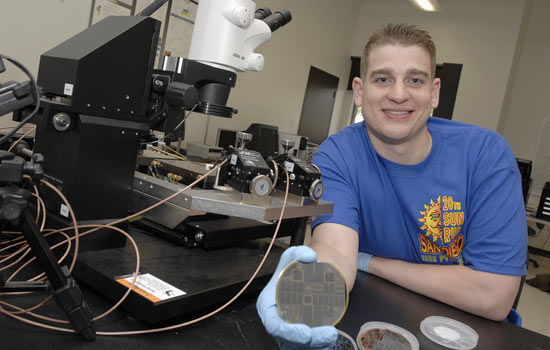Grad student to utilize alternative-energy sources
A. Sue Weisler
Cory Cress, who recently completed his Ph.D. in microsystems engineering at RIT, presents a photovoltaic cell used in his solar-energy research. Cress worked with the NanoPower Research Labs to study the use of quantum dots to enhance the efficiency and performance of photovoltaics.
One need look only at current gas prices to recognize the need for alternative-energy sources that will reduce dependency on oil while also improving the quality of the environment. However, Cory Cress, a recent graduate of RIT’s Ph.D. program in microsystems engineering, notes that while there is a wide variety of technologies that can be used in energy production, none are yet capable of fully replacing fossil-fuel sources.
The development of novel energy technologies, enhanced by the inclusion of nanomaterials, was the focus of Cress’ research efforts at RIT. As a graduate student researcher in the NanoPower Research Labs, Cress studied the use of quantum dots to enhance the efficiency and radiation tolerance of solar cells. Quantum dots are nanometer-sized semiconductors that exhibit unique optoelectronic properties and have significant potential for increasing the efficiency and cost effectiveness of solar cells.
“The utilization of nanotechnology could greatly improve the efficiency of solar cells and subsequently reduce their cost, making them applicable for solar power generation in a wide variety of fields,” notes Cress. “In addition, further understanding of the uses and properties of quantum dots could open up numerous opportunities for the technology in microelectronics, nanophotonics and biology.”
Cress’ research findings have been published in Applied Physics Letters and he has presented at several national and international scientific conferences. In addition, he received a fellowship from NASA to conduct additional research on the improvement of solar cells utilized in satellite technology. Cress, who also completed his bachelor’s and master’s degrees in industrial and systems engineering at RIT, is currently conducting postdoctoral research with the NanoPower Labs investigating portable integrated power supplies that incorporate solar cells, batteries and capacitors.
“I have spent a total of 10 years here at RIT and am extremely grateful to all of the professors and researchers who have enhanced my knowledge of physics and engineering,” says Cress. “I hope to have a similar impact on the lives of others through my own efforts in research and education in the future.”







